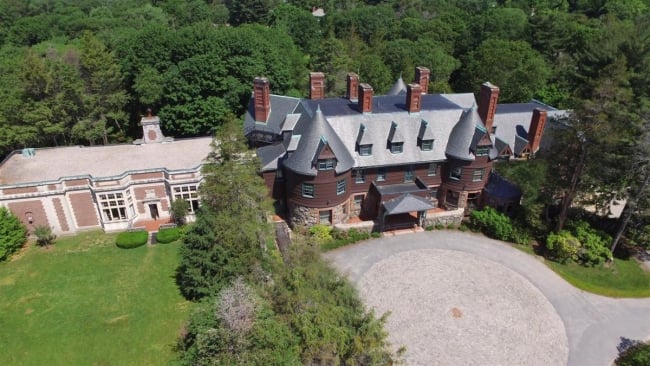You have /5 articles left.
Sign up for a free account or log in.

Pine Manor College administration building
Courtesy of Boaz Michaeli/Pine Manor College
Pine Manor College, a small, private liberal arts college just outside Boston in Brookline, Mass., will merge into Boston College, the two colleges announced Wednesday.
Tom O’Reilly, president of Pine Manor, was frank about the necessity of the merger. The pandemic has cut off most of the college’s revenue, and Pine Manor had been treading water since before O’Reilly arrived four years ago.
"Just weeks before I arrived, the college had been put under probation for its financial status," O'Reilly said. "We always shared out loudly, clearly, with donors, alums and the public media that we were a financially fragile institution."
Pine Manor’s revenue structure is not as tuition-driven as those of many small private colleges. The college relies on income from auxiliary services -- including its daycare, spring and summer English language cultural exchange programs, and hosting events like weddings and corporate meetings. The goal was to run the college more like a business, O’Reilly said, with a diverse set of revenue streams that could keep the college from sinking.
“Unfortunately, when COVID-19 came by, that shut it all down,” he said.
These auxiliary programs make up 50 percent of Pine Manor’s operating revenue, according to O’Reilly.
Boston College follows a more traditional revenue structure. Sixty percent of its operating revenue comes from tuition and 10 percent from the college’s $2.4 billion endowment. By comparison, Pine Manor’s endowment is a meager $8.7 million, much of which is restricted and unavailable for general spending.
The Pine Manor-Boston College deal is a good one, according to Neil Lefkowitz, a partner at the law firm Loeb & Loeb who has worked on several mergers, acquisitions and consolidations of colleges.
“It would be a pretty easy transaction if I was a trustee of Pine Manor to approve,” he said.
Under the deal, Pine Manor’s campus will become the Pine Manor Institute for Student Success, endowed with $50 million by Boston College. The new institute will oversee several existing Boston College offices, including Learning to Learn, Options Through Education and the Thea Bowman AHANA and Intercultural Center, according to a press release.
Current Pine Manor students will have the option to continue their studies at the college for two years, after which they can apply for transfer to Boston College’s Woods College for Advancing Studies. Boston College will take on some current Pine Manor faculty and staff, and others will receive severance and outplacement assistance.
Boston College will subsidize the costs of the two-year teach-out deal. The merger is pending approval from accreditors and “appropriate state agencies,” the press release said.
College mergers and acquisitions can be resource-intensive to pursue. But the opportunity was "too important to pass up," even amid the ongoing crisis, said Jack Dunn, associate vice president of university communications at Boston College.
“The agreement with Pine Manor College and Boston College is a win-win for both schools,” Dunn wrote in an email. “Pine Manor College’s focus on helping underrepresented students obtain college degrees clearly fits with Boston College’s origins as a school founded in 1863 to serve an immigrant population.”
Lefkowitz noted that Pine Manor sits on a valuable piece of real estate. He suspects that’s a reason why Boston College is interested in the merger.
The deal adds to a growing list of Boston-area college acquisitions. Boston’s elite colleges have over the years snatched up smaller institutions, slowly creating a larger footprint for themselves in and around the city while, merger proponents argued, they allowed stressed institutions' missions to continue.
In 1974, Boston College merged with Newton College of the Sacred Heart, which became the Boston College Law School, a mile and a half from Boston College’s Chestnut Hill campus. More recently, Wheelock College merged into Boston University in 2018 to become the Wheelock College of Education and Human Development at Boston University. In 2016, Tufts University added the School of the Museum of Fine Arts in Boston.
Whether Boston College will continue the many auxiliary operations of Pine Manor is still to be determined.
“The daycare program is certainly worthy of consideration,” Dunn said.
Lefkowitz expects to see more merger announcements as colleges start to bend under the mounting financial pressures of the pandemic.
“There’s quite a few colleges that you’re really not aware are in difficult financial condition, but trustees have really deferred making hard decisions,” Lefkowitz said. “The existence of the present crisis offers, if you will, a justification other than that the college has endemic problems.”




